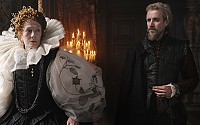
scr John Orloff
prd Roland Emmerich, Volker Engel, Christoph Fisser, Larry J Franco, Robert Leger
with Rhys Ifans, Vanessa Redgrave, David Thewlis, Edward Hogg, Sebastian Armesto, Rafe Spall, Jamie Campbell Bower, Joely Richardson, Xavier Samuel, Sam Reid, Mark Rylance, Helen Baxendale
release UK/US 28.Oct.11
11/UK Columbia 2h10

The lady doth protest: Redgrave and Ifans



TORONTO FILM FEST

 Based on the long-mooted Oxfordian theory about the true authorship of Shakespeare's plays and poems, this film undermines its own point by over-egging the story. An over-complicated script and arch performances don't help the case.
Based on the long-mooted Oxfordian theory about the true authorship of Shakespeare's plays and poems, this film undermines its own point by over-egging the story. An over-complicated script and arch performances don't help the case.
In 16th century London Edward (Ifans), Earl of Oxford, has a passion for writing, which is forbidden by the puritan leaders of the day. So he passes his anonymous work to playwright Ben Jonson (Armesto), who allows actor William Shakespeare (Spall) to take the credit. Edward's life is inextricably linked with Queen Elizabeth (Redgrave): they were lovers several years ago (played by Bower and Richardson), and the political fallout is still being controlled by William Cecil (Thewlis) and his son Robert (Hogg).
The film is set with several framing devices, starting on a present-day Broadway stage as Derek Jacobi introduces the story, which then jumps back and forth in time to reveal its melodramatic secrets. As everything falls into place, there's more than a whiff of soap opera to the saga, complete with illegitimate children, arranged marriages and shocking revelations.
Meanwhile, Shakespeare's plays and poems are portrayed with passion and energy. In other words, the filmmakers' main point seems to be that it doesn't really matter who wrote them, because they're still the pinnacle of English-language art. So as the backstage wrangling cranks up into a major political scandal, it starts to feel a little pointless.
In the central role, Ifans is camp and so overwrought that he begins looking a little silly. Redgrave is more effective as the offhanded, passionate monarch. Thewlis and Hogg are the requisite villains, evil for evil's sake, which gives them little chance to add texture. And while Spall is engaging comic relief as the clueless actor, he seems to be in a much more naturalistic movie than everyone else.
In the end, the film is watchable mainly because the plot is so outrageously contentious. We probably could have accepted the central authorship story if it hadn't been wrapped in such a lurid stream messy relationships. So in the end, we dismiss the whole thing as just another crazy fantasy from Emmerich. Now maybe he can get back to destroying the world.
 |
themes, language, violence, sexuality | 31.Aug.11 |

 Still waiting for your comments ... don't be shy.
Still waiting for your comments ... don't be shy.
HOME | REVIEWS | NEWS | FESTIVAL | AWARDS | Q&A | ABOUT | TALKBACK